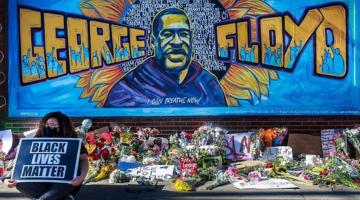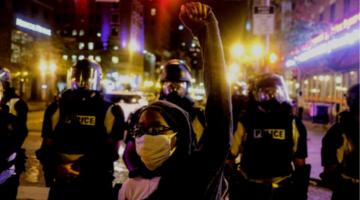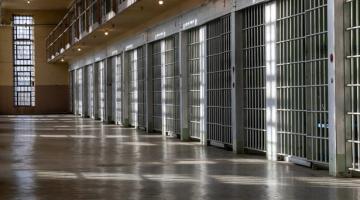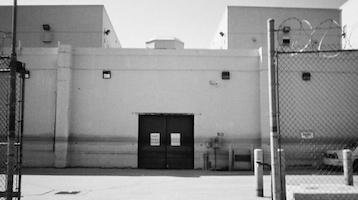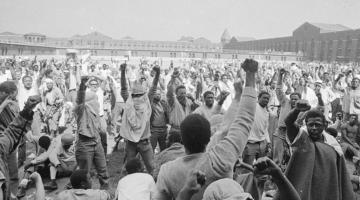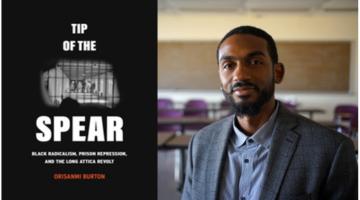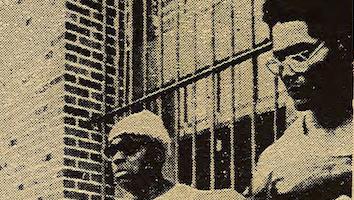“The men at Attica were prepared to die for the democratic principles not only enunciated in their Manifesto, but experienced in their revolt…”
Since 2021, The Black Agenda Review has reprinted historical statements, manifestos, and commentaries by and on Black political prisoners in the United States to commemorate Black August. We began this tradition with the publication of “Honor Fallen Black Freedom Fighters,” two statements on Black August written by San Quentin inmates that first appeared in the radical prisoner-support journal, Arm the Spirit in 1979. Since then we have reprinted: The Attica Liberation Faction Manifesto of Demands and Anti-Depression Platform, 1971; an essay and petition on the massacre at Attica published in the The Black Panther Intercommunal News Service; William L. Patterson’s essay “Racial Genocide: The Case of the Martinsville Seven”; Assata Shakur’s commentary “Women in Prison: How We Are;” a 1976 statement from the Marion Political Collecive; and “For George,” a letter by the Seventh of August Movment commemorating George Jackson. Last year we reprinted Safiya Bukhari’s 1995 essay “On the Question of Political Prisoners,” which originally appeared in the magazine Crossroad: A New Afrikan Captured Combatant Newsletter, published by Chicago’s Spear and Shield Publications.
This year, we offer “Attica then and Now!,” an essay on the Attica uprising written in 1971 by Acklyn R. Lynch, the legendary Trinidadian Black Studies professor and author of Nightmare Overhanging Darkly: Essays on African American Culture and Resistance (Third World Press, 1993). At the time, Lynch was a professor in the W.E.B. Du Bois Department of Afro-American Studies at the University of Massachusetts, Amherst; the essay was first published in a special issue of DRUM, the UMass Black student literary journal, dedicated to Black prisoners.
In “Attica then and Now!,” Lynch clears aside much of the noise and smoke around Attica and returns to the demands made by the prisoners themselves, as articulated in The Attica Liberation Faction Manifesto. For Lynch, the Manifesto is a revolutionary treatise that continues the intellectual and political legacies Malcolm X and George Jackson. It provides a radical challenge to the facile notions of democratic rights and traditions that are supposedly at the foundations of United States society. It demonstrated that the prisoners themselves were not only the most acute observers of the nature of the system of mass incarceration, but also of the society that produced that system of mass incarceration. And finally, Lynch recognized that the Attica inmates had regained their humanity through rebellion– and that freedom can only be obtained through revolt.
To mark Black August, Professor Acklyn R. Lynch’s “Attica Then and Now!” is reprinted below.
ATTICA THEN AND NOW!
Acklyn R. Lynch
The dramatic events at Attica have compelled us to examine fundamental aspects of social justice in the political matrix of this society. People around the world have expressed alarm at democracy's response to a confrontation, which challenged and perhaps undermined its tenets of justice and equality. There was no resiliency in the decision-making process to encourage a continuation of the dialogue or to prevent a polarization of forces. This allowed reaction to set in and madness to prevail. The anguished cries of those who were murdered, maimed or brutalized have been heard throughout the world. Their voices echo the context of exploitation that thousands (or even millions) of ordinary people, conscious of their oppression, have brought before the bar of humanity.
During the weeks following the massacre at Attica, people have written extensively on the collapse of the state and federal apparatus in the decision-making process. Even the appointment of investigating bodies, which will attempt to legitimize and justify the actions of the political leadership, will be compelled to highlight some inconsistencies in the final solution executed by the state. Speeches have been made about the dehumanizing aspects of prison life, the indisputable clarity of the inmates in their expressions of unity and collective struggle, and the history of betrayal which prisoners have experienced from officials in the legal and penal institutions, thereby compelling prisoners to question the integrity of negotiators and administrators. These issues have been debated hard and long, but in the rhetorical frenzy, we have forgotten to go back precisely to the character of the demands made by the prisoners at Attica.
This essay will deal explicitly with those demands, for it is in their very essence, their very nature, that the challenge to fundamental aspects of our "so called" democratic tradition projected an incompatible situation. The men at Attica genuinely believed that the society and perhaps Commissioner Russell Oswald were serious about the question of penal reform, even though they might have been aggrieved at the murder of George Jackson at San Quentin. Their Manifesto of Demands tore at the very fabric of the social structure and demanded that democratic rights become a vibrant and living part of the institutional structure so that there could be a radical transformation of their dehumanized reality.
In the preamble to the Manifesto the inmates heightened the facade of the rehabilitative process to which they have been submitted, by comparing it with "the ancient stupidity of pouring water on a drowning man in as much as they are treated for their hostilities by their program administrators with the latter's hostility as medication." The ineffectiveness of this rehabilitative process is not only dramatized by the high percentage of recidivism, but by the compelling story of Haywood Patterson in [the] Scottsboro Boys Trial as he emphasizes the neuroses and demonic tendencies of prison authorities, who have become victims of it in precisely the same sense as the prisoners.
In the preamble, the men at Attica emphasized that they have been denied not only due process of the law and other Constitutional Rights, but more importantly, as they seek to expand intellectually so that they might be in touch with social movements and world trends, they are systematically cut off from the pursuit of knowledge and "remanded to isolation status whenever they insist on their human rights to the wisdom of awareness." It is at this level that prison authorities are terrified by the growing political consciousness, sensitivity and keen perceptions of today's Black prisoners, who have come to understand that they are the most abused victims of an unrighteous social order. The Elliot Barclays, the Herbert X. Blydens, the Richard Clarkes etc, have become the architects, builders and broadcasters of a social ethic that has moved beyond the traditional liberal posture of penal reformist.
The demands were updated expressions of the arguments presented by Black prisoners in the decade of the sixties from Malcolm X to George Jackson. The demands were Constitutional, political, economic, social and cultural. They indicate a thorough grasp not only of the context of exploitation, but the effective conditions for substantive reform in the rehabilitative process.
The Manifesto emphasized the rights of legal representation at parole board hearings and the attendant procedural safeguards at parole revocation hearings. It called for improved and adequate medical attention and public health practices at a time when the society itself is attempting to come to grips with a national health crisis and inadequate facilities. It demanded that economic exploitation be stopped, but at the same time it recommended that opportunities for rehabilitation through preparation for entry into the productive processes of the industrial sector should be programmatically designed "by allowing those industries outside who desire to enter for the purpose of employment placement." They have recognized that working conditions in prisons did not develop working incentives parallel to the many jobs in the outside society, and "a paroled prisoner therefore faced many contradictions of the job that added to his difficulty of adjusting." This is a progressive reformist position, which the penal system should consider seriously, for it will inject a new dynamic in the rehabilitative process. It is certainly interesting that men, whom the reactionary elements consider to be revolutionary activists, provide a reformist alternative that will enhance social progress.
The Manifesto demanded the Constitutional right to peaceful dissent, and "an end to political persecution, racial persecution, and the denial of prisoners' rights to subscribe to political papers, books or any other educational and current media chronicles that are forwarded through the U.S. Mail." These are fundamental rights, which if abridged will only serve to undermine the rehabilitative process, for it is only with the free exchange of ideas in the market-place that men can grow with maturity to understand the precepts of social intercourse, and thereby validate democratic definitions.
The Manifesto expressed a high level of social awareness as it demanded an end to the unhealthy conditions of surroundings "reinforced by the escalating practice of physical brutality perpetrated on inmates." It called for "one set of rules governing all prisoners in the state of New York" rather than the totalitarian system which empowered each warden with ultimate authority for running the institution "as he sees fit."
The Manifesto expressed the architect's determination to challenge the present system of dehumanization, brutality and injustice. The men at Attica were prepared to die for the democratic principles not only enunciated in their Manifesto, but experienced in their revolt as they raised their level of consciousness and dignity to a spiritual plateau where individualism, fear and cowardice did not prevail, but rather the contours of collective integrity, effective unity of purpose and action, and a clear understanding that death is a reflection of a noble life. This was buttressed by their convictions that the human spirit will not yield to corrosive and destructive forces, but it will inscribe the truth of their struggle on the pages of history with blood, sweat and tears. Elliot Barclay, L.D., one of the brothers who was murdered at Attica reminded the negotiators that we should take seriously what has happened at Attica for the inmates' lives have been the fullest expression of the vital sinews of a revolutionary tradition.
Acklyn R. Lynch, “Attica Then and Now!” DRUM, 3 no. 1 (Fall 1971)

